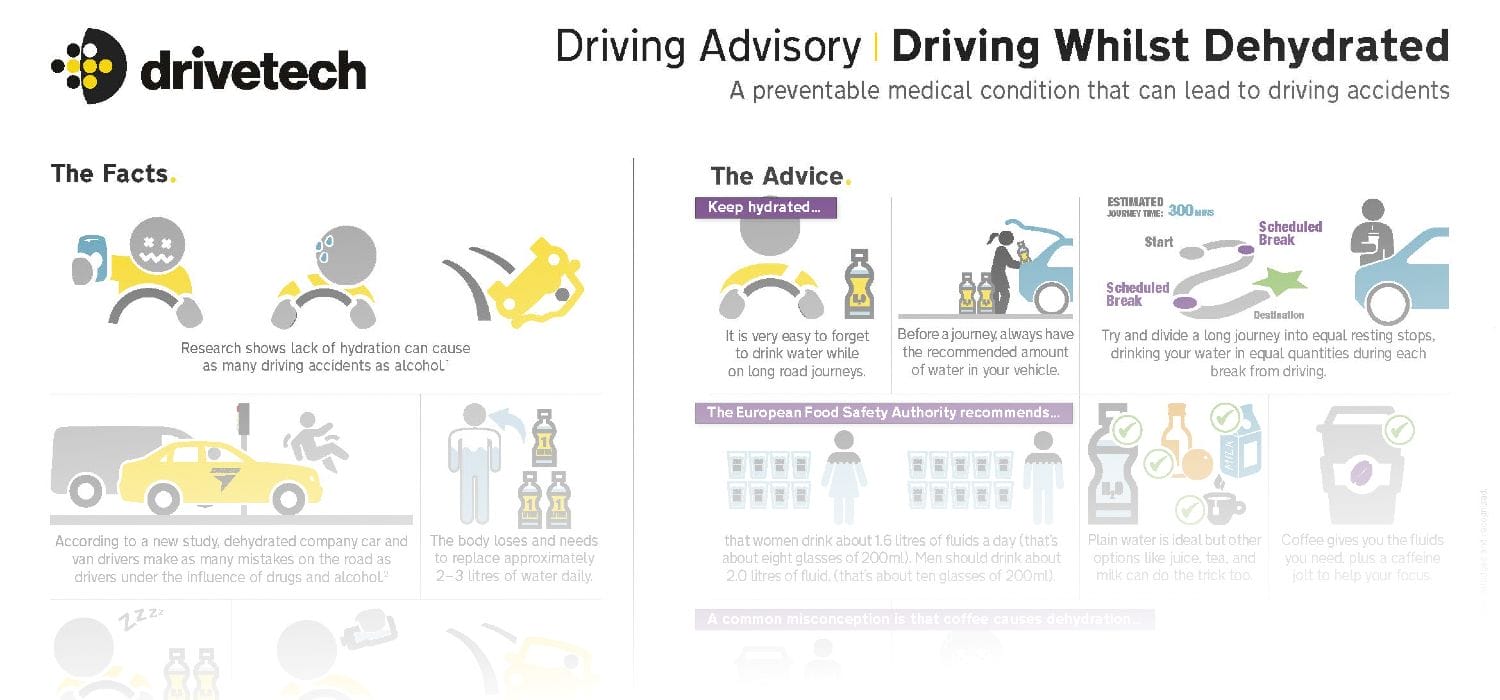
The summer may be over, but fleet managers and business owners should bear in mind that dehydration is an all-weather issue with the potential to cause accidents for UK drivers, says training specialist Drivetech, part of the AA.
Businesses have a duty of care to all employees driving for work purposes – even those driving their own vehicles. There are approximately 14 million grey fleet vehicles on the UK’s roads owned by employees which are used for business driving. Employers are responsible for ensuring these vehicles are adequately maintained and safe and drivers are being responsible behind the wheel, which includes keeping hydrated. If employers fail to do so, they may be liable for prosecution in the event of an accident under the Corporate Manslaughter Act 2007.
“Dehydration as an issue is often overlooked, but ultimately, it is a preventable medical condition that can lead to driving accidents,” says Colin Paterson, head of marketing at Drivetech. “It causes fatigue – you’re far more likely to feel tired when dehydrated. The European Food Safety Authority recommends that women consume 1.6 litres of water daily (eight 200 ml glasses) and two litres for men (ten 200 ml glasses). If you are not nearing these intake levels and start to feel thirsty on the road, dehydration is already setting in and impacting on your concentration levels, leaving you more likely to make mistakes.
“Business drivers are also more likely to worry about reaching their destination to avoid downtime and less willing to take all-important comfort breaks to refuel – and may even drink less water to avoid stopping on the road. That’s why we believe now is the time for managers to issue a hydration reminder to all employers, as business travel returns to pre-summer levels.”
Even mild dehydration can lead to reduced concentration and mood changes behind the wheel. A Loughborough University study (2015) revealed that drivers who have not consumed enough water make as many mistakes on the road as those who have been drinking alcohol – double those made by motorists who are fully hydrated.
Equally, coffee may not be as dehydrating as we have been led to believe, Paterson continues. “It’s unlikely that coffee causes your body to lose more fluids than it provides. There is some evidence to suggest that if a beverage contains large quantities of caffeine – i.e. more than 400 mg – the body will retain less of the fluid. But this doesn’t make it dehydrating.
“We urge employers and HR managers to prioritise driving safety during this busy period to ensure all drivers stay safe, hydrated and healthy on UK roads by sharing this best practice advice. It could be potentially life saving.”
Drivetech has compiled the following top tips to help drivers avoid dehydration on the road:
- Ensure you have water to hand before setting off for a long journey – carry a litre of water per passenger as a minimum
- Plain water is an ideal journey drink, but juice, milk, tea and coffee can also quench thirst
- If you have children in the car with you, ensure they have water bottles within easy reach to minimise distracting thirst complaints
- Divide a long journey into equal comfort break segments and consume the same volume of water each time
- Driving breaks must be taken before fatigue has a chance to set in. Our minimum recommendation is a 15-minute break for every two hours of driving
- Eating water-heavy foods can also help you stay hydrated, such as cucumbers, strawberries and bananas
Drivetech’s tips are also available as a pdf and can be found here as a tool to share with staff.
For more information about Drivetech, visit this site, home page here: www.drivetech.co.uk.
Back to news and resources